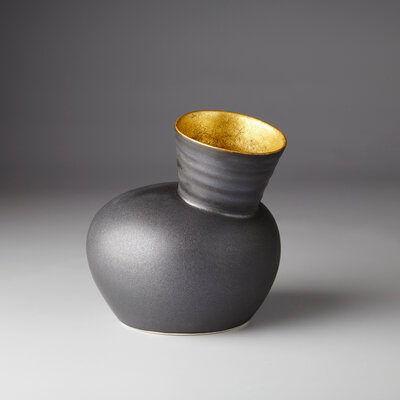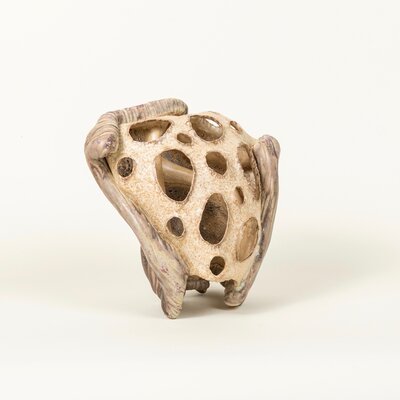Slab built ceramics – responding to place with Anna Lambert
Ref: S5D37847
About this course
Course Description
Embrace the location of West Dean Gardens, as you learn how to use drawing to develop designs for simple slab built ceramic platters and bowls. You will be guided to gather visual information and ideas, using note-taking and drawing.
You will also experiment with and practise the use of various mark-making techniques for use with tonal and coloured slips: relief embossing with lino; hand-cut paper stencils; stamping using hand-cut and found items; sgraffito drawing. You will be encouraged to find a combination of techniques that appeals to you. Using your drawings and tests, you will progress to a series of simple hand-built forms, followed by a longer study to develop ideas, using drawn and relief representations of landscape in clay.
There will be short practical demonstrations for each technique used and group discussions to encourage the generation of ideas and problem-solving. Individual, practical instruction and support will be tailored to your needs as the project develops. Techniques covered will include: clay slab rolling and handbuilding; painting with multiple layers of slips; making hand-cut stencils and stamps; simple lino cutting; use of texture and producing a good finish on rims and feet.
Materials used will be: pencil and crayons, graphite sticks or Sharpies for drawing, (plus a camera if wanted) and white earthenware clay mixed with Earthstone ES40 and coloured slips.
By the end of the course, you will have completed a major hand-built ceramic piece a large platter or bowl, or a non-functional piece, which represents your ideas about the local landscape. Pieces will be finished to leather-hard stage and can be left at the College or taken home for glazing and firing.
On the first evening, there will be a presentation about the use of drawing and landscape in ceramics, and a discussion about the timing of the various aspects of the course. Weather permitting, the second day will start with a short walk in West Dean Gardens, with note-taking and quick sketches. Please bring appropriate clothing.
Course Materials
Included
- Clay/glazing materials and firing costs of work made (Large work in size and quantity may be charged extra.)
What students need to bring
- Warm clothing and shoes suitable for a short walk
- An apron
- J cloths or old cotton sheeting to keep pots damp
- Plastic bags or sheets of plastic to wrap work in progress
- Drawing materials and sketchbook (Items for making bold marks are good.)
- Box, plastic bags and paper padding for transporting pieces home -Any pottery tools you wish to use (optional – some are supplied in the workshop or by the tutor).
We will use a small pointed vegetable knife, small wooden tools, scrapers, some texture tools, a small sponge, water sprayer, potter’s needle and other pointed tools, hake brushes, mop brushes and small watercolour brushes of various sizes.
Available to buy
Available from shop:
- Drawing paper (minimum A4)
- Small sketchbooks
- Pencils/felt tip pens/other drawing implements including Sharpies, coloured pencils or graphite sticks
- Pottery tools, pottery knife
- Soft cut lino sheets
- Lino cutting tools
Additional information
Firing And Glazing Options:
-
Leave selected raw, finished pieces, which you wish to keep, for biscuit firing, basic clear glazing and re-firing by the College, for collection within six months.
-
Take away your unfired pots for firing and glazing elsewhere.
Please wear appropriate clothing/aprons for the workshop or studio. This includes stout covered footwear, i.e. no open-toes or sandals, and safety boots, if specified.
Timetable
Arrival day - first date of course
Residential students can arrive from 4pm, non-residential students to arrive by 6.45pm for registration
Student welcome, followed by dinner: 6.45pm (dinner included)
Teaching session: 8pm-9pm (attendance is essential)
Daily timetable
Course teaching: 9.15am-5pm
Morning session: 9.15am-12.45pm including coffee/tea break
Lunch break: 12.45pm-2pm (lunch included)
Afternoon session: 2pm-5pm including coffee/tea break
Teaching finishes: 5pm
Evening working: students may have access to workshops until 9pm, but only with permission from the tutor and provided any health and safety guidelines are observed.
Departure day - last date of course
Course teaching: 9.15am-3pm (lunch included)
Teaching finishes: 3pm
Residential students will need to check out of rooms by 10am.
Please note, the tutor may make slight variations to the daily timetable as required.
General Information
Tutors

Accommodation
Residential option available. Find out accommodation costs and how to book here.

Further study options
Take the next step in your creative practice, with foundation level to Masters in Fine Art study.
Depending on your experience, start with an Online Foundation Certificate in Art and Design (one year, part-time), a Foundation Diploma in Art and Design made up of 10 short courses taken over two years (part-time) or advance your learning with our BA (Hons) Art and Contemporary Craft: Materials, Making, and Place (six years part-time). All will help you develop core skills, find direction in your practice and build an impressive portfolio in preparation for artist opportunities or higher-level study. See all degree and diploma courses.



